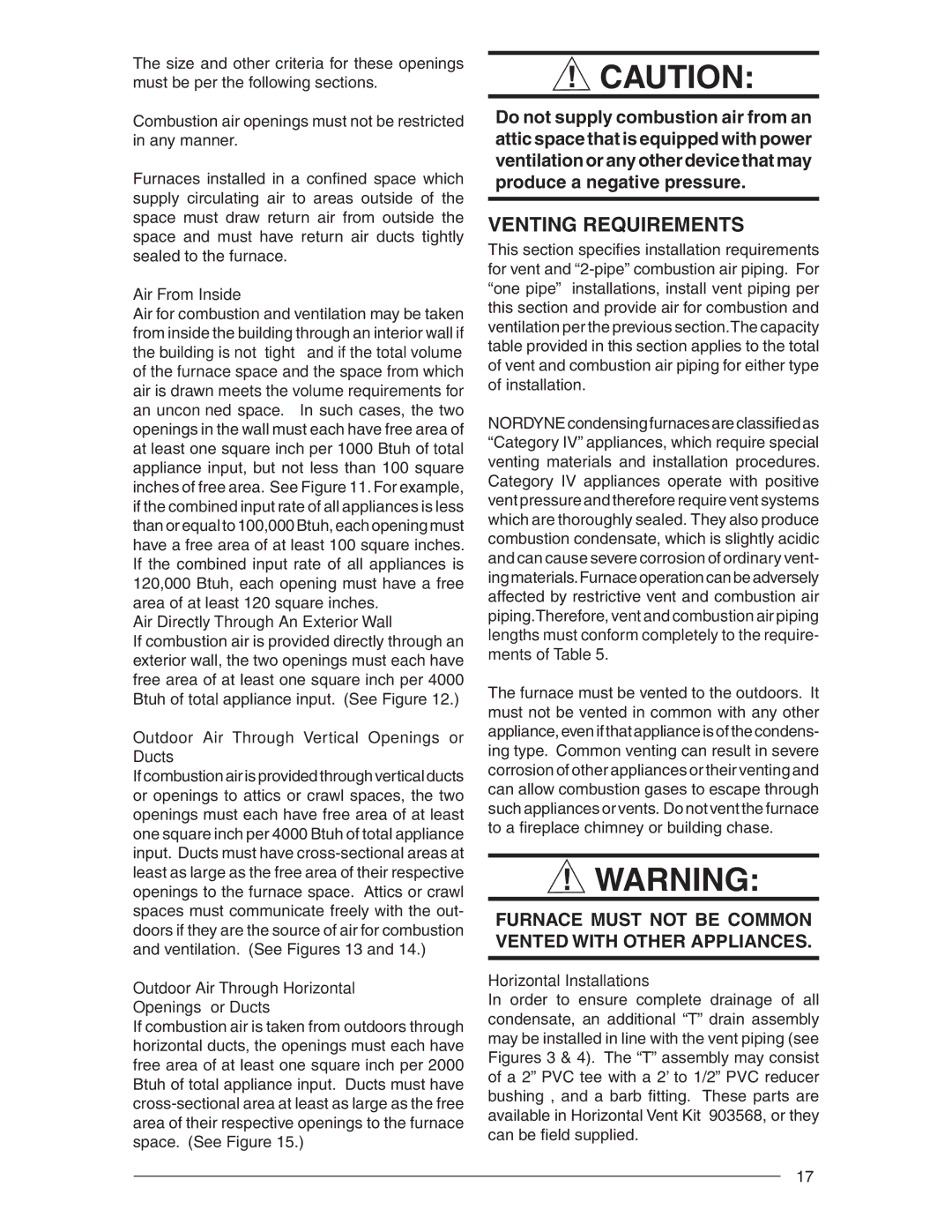
The size and other criteria for these openings must be per the following sections.
Combustion air openings must not be restricted in any manner.
Furnaces installed in a confined space which supply circulating air to areas outside of the space must draw return air from outside the space and must have return air ducts tightly sealed to the furnace.
Air From Inside
Air for combustion and ventilation may be taken from inside the building through an interior wall if the building is not “tight” and if the total volume of the furnace space and the space from which air is drawn meets the volume requirements for an unconfi ned space. In such cases, the two openings in the wall must each have free area of at least one square inch per 1000 Btuh of total appliance input, but not less than 100 square inches of free area. See Figure 11. For example, if the combined input rate of all appliances is less than or equal to 100,000 Btuh, each opening must have a free area of at least 100 square inches. If the combined input rate of all appliances is 120,000 Btuh, each opening must have a free area of at least 120 square inches.
Air Directly Through An Exterior Wall
If combustion air is provided directly through an exterior wall, the two openings must each have free area of at least one square inch per 4000 Btuh of total appliance input. (See Figure 12.)
Outdoor Air Through Vertical Openings or Ducts
If combustion air is provided through vertical ducts or openings to attics or crawl spaces, the two openings must each have free area of at least one square inch per 4000 Btuh of total appliance input. Ducts must have
Outdoor Air Through Horizontal
Openings or Ducts
If combustion air is taken from outdoors through horizontal ducts, the openings must each have free area of at least one square inch per 2000 Btuh of total appliance input. Ducts must have
!CAUTION:
Do not supply combustion air from an attic space that is equipped with power ventilation or any other device that may produce a negative pressure.
VENTING REQUIREMENTS
This section specifies installation requirements for vent and
NORDYNE condensing furnaces are classified as “Category IV” appliances, which require special venting materials and installation procedures. Category IV appliances operate with positive vent pressure and therefore require vent systems which are thoroughly sealed. They also produce combustion condensate, which is slightly acidic and can cause severe corrosion of ordinary vent- ing materials.Furnace operation can be adversely affected by restrictive vent and combustion air piping.Therefore, vent and combustion air piping lengths must conform completely to the require- ments of Table 5.
The furnace must be vented to the outdoors. It must not be vented in common with any other appliance, even if that appliance is of the condens- ing type. Common venting can result in severe corrosion of other appliances or their venting and can allow combustion gases to escape through such appliances or vents. Do not vent the furnace to a fireplace chimney or building chase.
!WARNING:
FURNACE MUST NOT BE COMMON VENTED WITH OTHER APPLIANCES.
Horizontal Installations
In order to ensure complete drainage of all condensate, an additional “T” drain assembly may be installed in line with the vent piping (see Figures 3 & 4). The “T” assembly may consist of a 2” PVC tee with a 2’ to 1/2” PVC reducer bushing , and a barb fitting. These parts are available in Horizontal Vent Kit 903568, or they can be field supplied.
17
